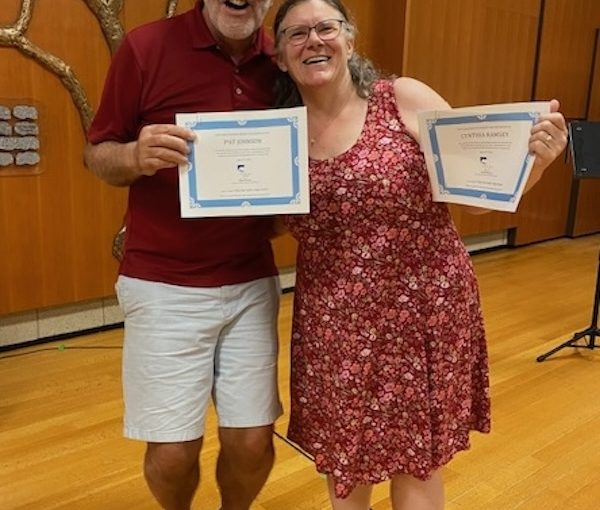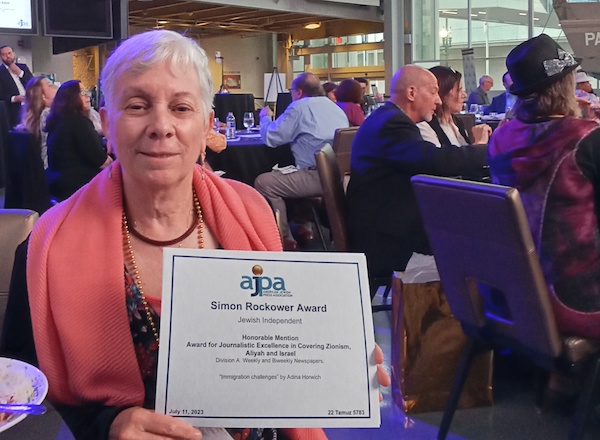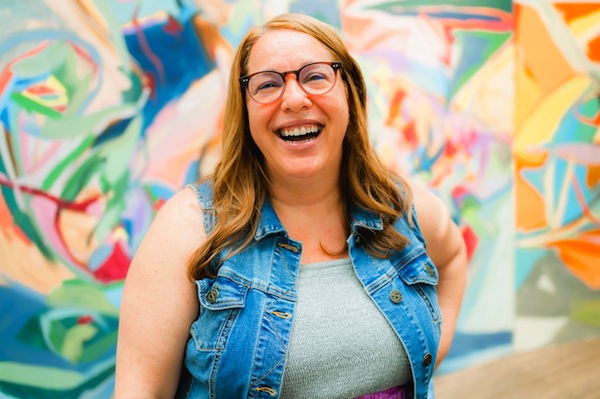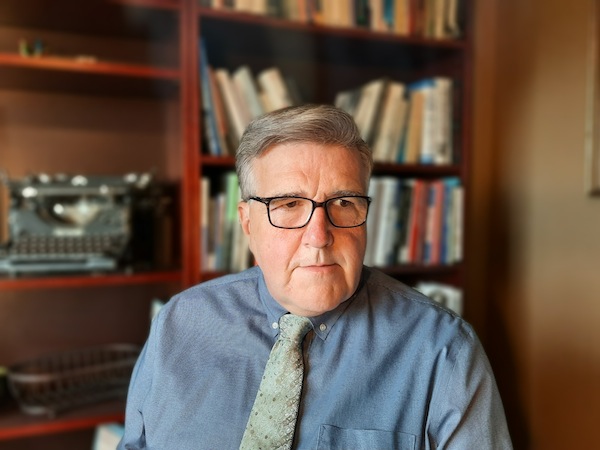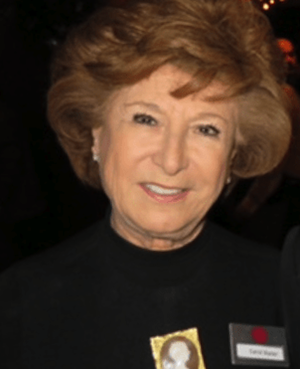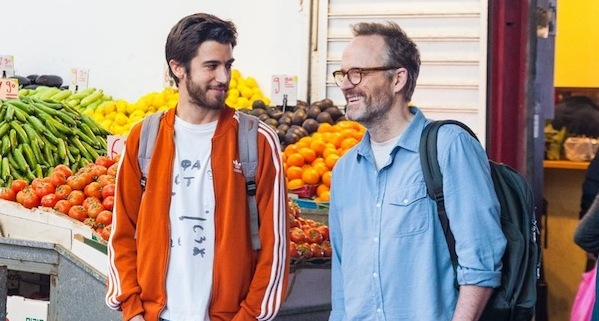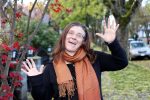Pat Johnson and Cynthia Ramsay after their presentation about the Jewish Independent at Congregation Har El’s Seniors Lunch July 17. The pair were asked to participate by lunch organizers Tim Newman and Kala Solway. They each received a certificate of thanks and a thank-you gift from Noga Vieman, the synagogue’s programming and education director. (photo by Lorraine Katzin)
Tag: Pat Johnson
Rally highlights resilience
Those who gathered for the weekly rally to call for the release of the Israeli hostages take their message down Georgia Street on Sunday, March 17. (photo by Cynthia Ramsay)
After five months of attending almost every one of the weekly rallies for the Israeli hostages, I found myself Sunday on the other side of the crowd. Daphna Kedem, the organizer of these events, invited me to address the audience on March 17, alongside Rabbi Philip Bregman and Michael Lee, member of the Legislative Assembly for Vancouver-Langara.
I was speaking on nobody’s behalf but my own, although my nearly 30 years of writing for this Jewish newspaper, my being the director of Upstanders Canada, which fights antisemitism, and just generally my being a non-Jew who is a keen Zionist, were presumably the reasons I was asked to speak.
Someone whose primary role is reporter does not like to become part of the story. This is different. I am a journalist (among other things) but there are identities and values that, in my view, supersede journalistic constraints – support for democracy, for example, and free expression. Zionism covers a wide swath of opinion and experience and I fall on that spectrum. There is no point in pretending I don’t.
Several people have requested that the Independent print the full text of my remarks. We have not done this for other speakers over the past five months, and this issue is jam-packed with news around related topics of allegations of antisemitism in the province so there is not space to run the entire speech. However, we have posted it on the paper’s website, with apologies to the dozens of speakers whose words have not been shared in their entirety over the past five months. Insider privilege, undoubtedly.
Even though the audience at these vigils is overwhelmingly Jewish, I felt my message should be aimed at non-Jewish people.
I’m also angry, and I decided to let that show. In addressing those gathered at the Vancouver Art Gallery, where the weekly rallies for the Israeli hostages are held, I observed that I was standing on the same steps where, days after the pogrom of Oct. 7, people stood and celebrated murder, rape, beheadings and kidnappings.
“We mourn,” I said, “We grieve every single innocent life lost. We do not celebrate dead innocents. Neither do we tally up bodies in a grotesque competition where the side with the most dead wins moral victory.”
I warned that it is not only Jews and Israelis who are threatened by the behaviours of anti-Israel activists.
“The violence, coercion, intimidation and racism these people embody is a threat to Canada … to our civility, our peace, our multiculturalism and political discourse,” I said.
Maybe, I suggested, there are Canadians who don’t care if the Jewish people lose their country.
“But when they wake up and see that Canadians have lost ours … Jewish Canadians and their allies will be asking: Where were you? Where were you when we were standing up for the values that Israelis and Canadians share? Where were you when we demanded ‘bring them home’? Because, if you are not standing with Israelis against extremism … you are emboldening extremism in Canada.
“This is not about choosing between Israelis and Palestinians,” I said. “Unlike the extremists, we want peace for everyone. This is about choosing between civilization and barbarism. And we need to ask every Canadian: Which side are you on?”
Before I spoke, Kedem shared comments made the night before at the weekly rally in Tel Aviv, with relatives of living and dead hostages urging Prime Minister Binyamin Netanyahu to do everything in his power to negotiate their release.
Kedem told the crowd that former cabinet minister Selina Robinson was to address the rally but security concerns prevented her from attending.
“I think it’s very, very sad moment for us that we can’t have a Jewish representative walk the streets of Vancouver in 2024,” said Kedem.
Robinson sent remarks, which were read by Kamiel Kruse. Those remarks can also be read in their entirety on the Independent’s website. Robinson stressed the rally’s theme of resilience, sharing many examples of where she finds resilience.
“Resilience comes from seeing the Oct. 7 survivors of rape and torture pick up the pieces of their lives. It comes from seeing Israelis gather once again to protest their government. It comes from so many of you who have reached out with words of support, encouragement and love,” wrote Robinson.
“Resilience comes from us gathering our collective strength as we lift each other up and remind ourselves that we are not alone – that together we will find the strength – the strength to bring peace,” she concluded.
Bregman – who was the senior rabbi of Temple Sholom from 1980 until 2013 and then was executive director of Hillel BC and created the Other People, an interfaith and multicultural group that has spoken to some 7,500 students and faculty about racism and bigotry – also spoke of resilience.
He contextualized current events as part of a very long Jewish history, with almost 4,000 years of steadfastness in the face of challenges, Temple destructions, expulsions, Crusades, pogroms and worse. He spoke of his own experiences growing up with antisemitism in rural Ontario, and the firebombing of Temple Sholom synagogue, then on West 10th Avenue, on Jan. 25, 1985.
Through all this ancient and modern history, Bregman said, one thing has remained constant.
“The message is clear. We are not going anywhere,” he said. “We are here.”
Lee had just returned from Germany and a meeting of state and provincial legislators from the United States, Germany and Canada. He reflected on the extremism that is rising in places around the world.
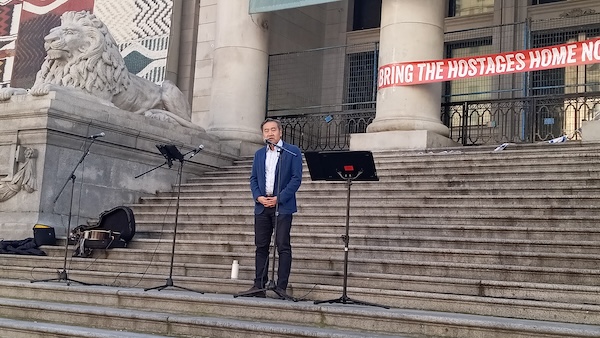
Part of the BC United party, Lee said he strives to avoid partisanship when speaking at these rallies to help ensure “that the Jewish community is not made a political football” and he assured Jewish community members that they have allies on both sides of the Legislature.
Lee called for the province to fully adopt the International Holocaust Remembrance Alliance Working Definition of Antisemitism because it would clarify discussions. Some of the commentary being heard today falls directly into at least one of the examples accompanying that definition, he said.
“Denying Jewish people the right of self-determination by calling the state of Israel a racist endeavour is an example of antisemitism,” he said.
Lee was recently shuffled into the role of opposition critic for the attorney general, a position he had held before, and he said he has called on the AG to take a stronger line in the justice system against potential hate crimes.
“We need the attorney general to direct Crown counsel to prosecute the Criminal Code violations which are antisemitic and hate crimes incitement to public violence that are antisemitic in nature on our streets,” he said.
Lee lauded Robinson’s work in the Legislature, especially her commitment to the Jewish community.
“I am very disappointed, like so many of you, that she is not able to be here with you,” said Lee, who has spoken admiringly in the Legislature and elsewhere about Robinson. “But she is with you, you know that. Selina has always been with you. She will always be with you.”
Throughout the afternoon, Mia Mor sang and Richard Lowy joined on guitar and vocals.
JI wins four Rockowers
Adina Horwich at the 42nd annual Rockowers Awards. She received an honourable mention for journalistic excellence in covering Zionism, aliyah and Israel. (photo from Adina Horwich)
The Jewish Independent won four Simon Rockower Awards for Excellence in Jewish Journalism this year. The awards, which are given out by the American Jewish Press Association, were for work done in 2022. The JI has had a few Rockower hat tricks in its history, but this is the first time the paper has garnered four honours in one year.
The awards were presented on July 11 at the Higgins Hotel and Conference Centre in New Orleans, La., where the AJPA’s annual conference was held. The JI mainly competed in the division of weekly and biweekly newspapers, but there were some categories for which the competition was between all types of media (print and online); awards were given for first and second place, and sometimes honourable mention.
Writer Adina Horwich traveled from her home in Israel to New Orleans to receive her award in person. She won the JI an honourable mention for journalistic excellence in covering Zionism, aliyah and Israel for her article “Immigration challenges” (jewishindependent.ca/immigration-challenges-2). The piece both reviews Adi Barokas’s Hebrew-language graphic novel, The Journey to the Best Place on Earth (and Back), about Barokas’s experience trying to immigrate to Vancouver from Israel, and shares Horwich’s experience making aliyah from Canada. The jury commented: “Extremely readable story, that skilfully explores from a personal perspective the nitty gritty of making aliyah.”
The JI’s Pat Johnson also received an honourable mention – his article “Oasis in the Caucasus” (jewishindependent.ca/oasis-in-the-caucasus) garnered recognition for excellence in writing about Jewish heritage and Jewish peoplehood in Europe. The jury said about his piece:
“A terrific look into the Jewish community of Azerbaijan that most of us, unfortunately, don’t have on our ‘Must-Go Places to Visit.’ Pat Johnson’s very nice story strongly suggests otherwise. Johnson paints a wonderful picture of this tucked-away ‘shtetl’ where the residents say they have never faced antisemitism. If only we could feel so lucky here in the United States! And while most of us do well playing ‘Jewish geography,’ actual world geography is often more of a challenge. Having Johnson admit having to Google Azerbaijan before traveling there to report this story added a nice touch that connects with readers who may also be unfamiliar with the country – but now more knowledgeable thanks to this feature.”
Johnson was recognized for another of his articles, “Maus not too graphic” (jewishindependent.ca/maus-not-too-graphic), which placed second for excellence in education reporting. Johnson sat in on Anna-Mae Wiesenthal’s Holocaust and Genocide Studies class at King David High School, and listened as students discussed the graphic memoir Maus by Art Spiegelman.
“Lots of people laughed when a Tennessee school board pulled Maus from the curriculum because of the drawing of a naked cat. That was too much for board members and they banished the Pulitzer Prize-winning graphic novel,” wrote the Rockower jury. “Viewing the book through the eyes of five students at a Jewish high school subtly portrays the board decision’s absurdity.”
Rounding out the JI wins was a first place for excellence in editorial writing – where all entries competed in the same division. The JI editorial board of Johnson, Basya Laye and me were honoured for the set of editorials that included “Every person has a voice” (about Elon Musk, hatred and misinformation online, and how people can counter such forces), “Extremism not helpful” (about New Democratic Party leader Jagmeet Singh’s views on the Israeli-Palestinian conflict) and “New era in U.S. politics” (about the U.S. Supreme Court’s rejection of a woman’s right to reproductive self-determination, as well as the Jewish perspective on abortion).
About these editorials the Rockower jury wrote: “These pieces are good examples of what editorials should be – thoughtful examination of pressing issues, using clear reasoning in looking at both sides, then coming to a well-reasoned conclusion. Local tie-ins strengthen opinions.”
All of us at the JI appreciate the AJPA’s recognition of the hard work that goes into producing an independent Jewish newspaper, magazine or website, and we congratulate all of our colleagues on their achievements. For the full list of Rockower winners, visit ajpa.org.
The JI couldn’t do what we do without our subscribers, donors and advertisers – thank you for all your support. For readers who are thinking about subscribing, donating or advertising, please consider doing so to help us continue producing a high-quality, independent Jewish newspaper that connects community members from across the religious and political spectrums; covers lifecycle events and local, national and international news; and documents our community history as it happens. Visit jewishindependent.ca/support-the-ji, email cramsay@jewishindependent.ca or call 604-689-1520.
On being an Upstander
Pat Johnson, founder of Upstanders Canada. (photo from Upstanders Canada)
Pat Johnson, the founder of Upstanders Canada, addressed the importance of standing up to antisemitism during a March 5 Zoom lecture organized by Kolot Mayim Reform Temple in Victoria. Upstanders mobilizes non-Jewish Canadians to confront antisemitism and anti-Zionism.
Johnson writes for many media outlets, including the Jewish Independent, where he is also on the editorial board. Over the years, he has worked for many Jewish organizations. He was quick to stress that, as a non-Jew, he is not trying to tell Jews what is antisemitism, but rather share his experiences fighting and studying it.
Due to the complexity of the ways in which antisemitism and anti-Zionism may overlap, Johnson defined anti-Zionism – as opposition to the existence of a Jewish state, and not as criticism of Israel – and then moved on to his topic.
Of primary concern in recent years, he said, is the notion of non-Jews laying claim to the definition of antisemitism, thereby effectively telling Jews whether or not their experiences with antisemitism are valid.
“Jewish people are treated differently than every other group, even by people who self-define as anti-racist, and I argue that this is proof itself of a problem,” said Johnson.
He maintains that, on such issues as the definition of antisemitism as put forward by the International Holocaust Remembrance Alliance (IHRA), some people “are willing to devote more resources to fighting over the definition of antisemitism than they are to fighting against antisemitism.”
As a result, he said, there is a more contentious discussion around antisemitism than any other form of racism. Antisemitism is different from other forms of bigotry because Jews can be of any race, colour or identity; therefore, they do not conveniently fall into any racial categories.
“Fighting discrimination against Jewish people has to some extent fallen through the cracks, in part because many people simply do not understand it, cannot see it, deny it or simply wish it away,” said Johnson. “We are dealing overwhelmingly with unconscious biases. People do not even realize they carry them. So, when we call someone out for a statement that appears to us to be premised on antisemitic stereotypes, it just doesn’t resonate.”
Johnson then discussed how antisemitism is not a problem of Jewish making. Rather, it is a product of the antisemitic imagination, a caricature. “In a weird way, antisemitism has nothing to do with Jews, except that Jews are the collateral damage in a corrupt world poisoned by antisemitic ideas,” he said.
Antisemitism comes in myriad forms and is not simply a matter of people hating Jews, he said. “If we think it is, we will never overcome it.”
Johnson provided numerous examples throughout the past several centuries of Jews serving as scapegoats, as well as more recent examples, including the denial in various circles of hate crimes committed against Jews, the abundance of anti-Jewish hostility in Arab media and the inevitability in nearly all conspiracy theories that Jews are lurking somewhere in the background as the masterminds.
Johnson spoke about the manifestation of antisemitism in progressive movements, making it clear that his criticisms were not being made from a right-wing standpoint. “These are my people and I have seen it up close,” he said of the left.
Johnson said discrimination is often the result of economic circumstances. Jews, from a Marxist perspective, are seen as a privileged economic class and not as a disadvantaged minority. Therefore, if taken a step further, lowering the Jewish status a peg can be translated, by some, not as prejudice but the advancement of equality.
“It is a racist economic critique, but I am absolutely certain that this is a core underpinning of antisemitism and unconscious bias about Jews that we see on the left,” Johnson said.
Right-wing antisemitism tends to be more overt and fundamentally racial and so it is more easily identifiable, he said. Left-wing antisemitism, in Johnson’s experience, is different.
“Even Jeremy Corbyn, the former British Labour Party leader, whom I would argue is a bare-faced, dyed-in-the-wool antisemite, maintained enough plausible deniability that perhaps he himself believed he was free from antisemitic ideas. Antisemites on the right don’t bother deluding themselves about where they stand,” he said.
To Johnson, the left’s ambivalence to antisemitism is all the more dispiriting because it ignores the contributions Jews have made in building progressive movements.
“If most leftists are not engaged in antisemitism, they are not engaged in fighting it, either,” Johnson said. “Betrayal hurts most because it does not come from your enemies. To admit that antisemitism has gotten worse during our lifetimes offends our progressive values.”
Johnson believes there may be a long struggle ahead in confronting antisemitism, though he did mention lessons he has learned in this battle. These include being intellectually prepared with an argument before problematic situations arise, so as not to be overwhelmed by emotion in the moment, and not assuming ill will when ignorance may be more likely. He noted that, while calling out antisemites is crucial, calling in those who unknowingly say or do something antisemitic is as important.
For more information about Upstanders Canada, visit upstanderscanada.com.
Sam Margolis has written for the Globe and Mail, the National Post, UPI and MSNBC.
Community milestones … awards, honours, weddings, releases
Leamore Cohen (photo by Efrat Gal-Or Nucleus Photography)
The Jewish Community Centre of Greater Vancouver’s inclusion services program is one of the recipients of the Lieutenant Governor’s Arts and Music Awards, in the category of visual arts. This one-time honour, marking the Queen’s Platinum Jubilee, recognizes organizations like the JCC that have excelled in fostering wide community engagement through a robust spectrum of arts and culture programs. Most important: the award emphasizes the JCC’s commitment to diversity and inclusivity.
It all began with a passionate letter of nomination by Chaia Schneid, whose daughter, Sarah Halpern, discovered “a previously untapped creative passion” in the Art Hive and Theatre Lab classes she attended, among other programs run through the JCC’s inclusion services. Writing to the Hon. Janet Austin, lieutenant governor of British Columbia, Schneid stated: “The quality of the arts and culture programs is unlike anything we have found elsewhere. They are professionally delivered and of the highest calibre, and yet individualized to meet the special needs of the diverse participants.” In particular, Schneid praised the JCC’s annual Jewish Disability and Awareness Inclusion Month (JDAIM). Schneid also praised current program director and inclusion services coordinator Leamore Cohen, calling her a “rare individual.”
Shelley Rivkin, vice-president, local and global engagement, at the Jewish Federation of Greater Vancouver wrote a letter of support for the nomination. In it, she highlighted several inclusion services arts and social programs, and Cohen’s leadership.
“Leamore Cohen is the driving force behind these programs and her compassion, creativity and commitment to inclusion shine through in all aspects of the program,” wrote Rivkin. “She is always generating new ways and ideas for participants to engage with the arts and to create to the best of their abilities. These programs break new ground by offering meaningful educational and recreational opportunities for people with diverse needs. Having had the opportunity to attend some events, I have seen firsthand the joy that participants feel in being able to express themselves in a variety of mediums and the pride that their parents and family members experience when they see the creativity and talent of their loved ones.”
For a growing number of Vancouverites from all religious and ethnic backgrounds, and across all ages and abilities, the calibre and range of the JCC’s work is well-known. A schedule of performing and fine arts programs coincides with an array of sport, leisure and fitness options inside a facility that houses a theatre, library, gymnasium and pool. The JCC is also widely known for its annual Jewish Book and Chutzpah! festivals – both occupying a key place in the city’s cultural calendar – alongside community services including preschool and toddler daycare.
“While the arts programming is the centrepiece of what is being offered,” wrote Rivkin, “other inclusion programming for adults includes free memberships and access to all the fitness and wellness facilities at the Jewish community centre along with two virtual classes offered five days a week that are designed to be sensitive to the sensory stimulation needs of participants.”
Noting that activities continued throughout the pandemic, Rivkin concluded, “the program demonstrates its dedication to equity and inclusion daily by the range of programs embedded in the arts that have been opened up to this population and, of course, commitment, both on the part of Leamore Cohen, who dedicates so much time and thought to designing these programs, and to the participants themselves, who have remained active and involved despite their personal barriers and the COVID restrictions.”
* * *
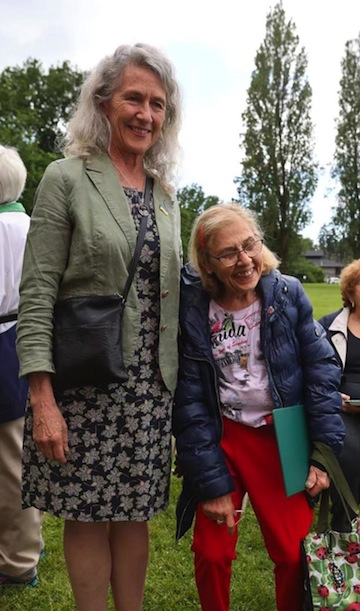
On June 18, Annette Whitehead was awarded a Queen’s Platinum Jubilee pin by MP Joyce Murray. Whitehead was nominated for the honour by Kitsilano Community Centre for her outstanding commitment and dedication to her community. She also received a certificate as a sign of gratitude for all the wonderful and hard work she does for her constituency.
June 2022 marked the 70th anniversary of the coronation of Queen Elizabeth II. To commemorate this milestone, Murray was issued a number of Platinum Jubilee pins, which she decided would be best used to celebrate and thank those who volunteer in Vancouver Quadra. The ceremony took place at Trimble Park.
* * *
On July 7, the National Audubon Society announced the winners of its 13th annual Audubon Photography Awards. This year, judges awarded eight prizes across five divisions from a pool of 2,416 entrants from all 50 states, Washington, D.C., and seven Canadian provinces and territories.
Local Jewish community member Liron Gertsman won three awards:
- Professional Award Winner for his photo of a white-tailed ptarmigan,
- Professional Honourable Mention for his photo of a sharp-tailed grouse, and
- Video Award Winner for his sharp-tailed grouse video.
In a July 7 Facebook post, Gertsman writes about his wins: “Getting a chance to shine some light on these often under-appreciated birds brings a big smile to my face!”
He also writes about the white-tailed ptarmigan:

“Perfectly adapted to harsh alpine conditions, they spend most of their time foraging on small plant matter in the tundra, insulated from the wind and cold by their warm layers of feathers. Ptarmigan are also famous for changing their feathers to match their snowy surroundings in the winter, and their rocky surroundings in the summer. This mastery of camouflage makes them very difficult to find, and I’ve spent countless hikes searching for them, to no avail. On this particular day, after hiking in the alpine for a couple of hours, I stumbled right into my target bird! This individual was part of a small group of ptarmigan that were so well camouflaged, I didn’t notice them until some movement caught my eye just a few yards from where I was standing. Wanting to capture these remarkable birds within the context of their spectacular mountain domain, I put on a wider lens and sat down. The birds continued to forage at close range, and I captured this image as this individual walked over a rock, posing in front of the stunning mountains of Jasper National Park.”
* * *
At the Rockower Awards banquet, held in conjunction with the American Jewish Press Association’s annual conference, June 27, 2022, in Atlanta, Ga., the Jewish Independent received two Simon Rockower Awards for Excellence in Jewish Journalism. These awards honoured achievements in Jewish media published in 2021 and there was a record-breaking 1,100-plus entries from AJPA members.
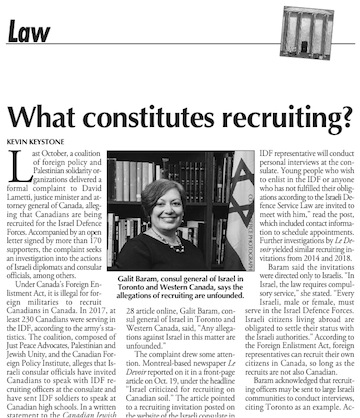 In the news story category, in the division of weekly and biweekly newspapers, the ˆI took second place for Kevin Keystone’s article “What constitutes recruiting?” The piece explored the allegation by a coalition of foreign policy and Palestinian solidarity organizations that Canadians are being recruited for the Israel Defence Forces.
In the news story category, in the division of weekly and biweekly newspapers, the ˆI took second place for Kevin Keystone’s article “What constitutes recruiting?” The piece explored the allegation by a coalition of foreign policy and Palestinian solidarity organizations that Canadians are being recruited for the Israel Defence Forces.
For excellence in editorial writing, in which all member papers competed, the JI editorial board of Pat Johnson, Basya Laye and Cynthia Ramsay received an honourable mention, or third place. “Strong reasoning and writing, relevant to Jewish audience,” wrote the judges about the trio of articles submitted. The submission included “Ideas worth the fight,” about university campuses and the need to keep “engaging in the battle of ideas, however daunting and hopeless the fight might appear”; “Tragedy and cruelty,” about the response to the catastrophe at Mount Meron on Lag b’Omer in 2021; and “Antisemitism unleashed,” about how the violence in Israel in May 2021 year spilled out into the world with a spike in antisemitic incidents.
To read all of these articles again, visit jewishindependent.ca. For the full list of Rockower winners, check out ajpa.org.
* * *
Myriam Steinberg’s Catalogue Baby: A Memoir of Infertility, with illustrations by Christache, has won two gold medals for best graphic novel. The first was the Independent Publishers (IPPY) Awards, and the second is the Foreword Indies Award. This is after having won the Vine Award for Canadian Jewish Literature last fall.
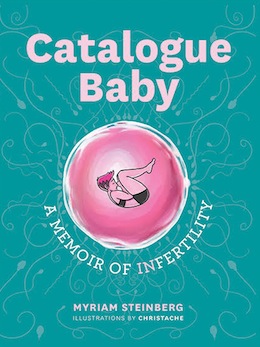 “This book was not only a labour of love, but also a call-out to the world to recognize and acknowledge the very real experience of so many people,” wrote Steinberg in an email. “Pregnancy loss and/or infertility touch almost everyone in some way or other. It affects those who are trying to conceive the most, but it also touches (often unbeknownst to them) their children, friends, family and colleagues.”
“This book was not only a labour of love, but also a call-out to the world to recognize and acknowledge the very real experience of so many people,” wrote Steinberg in an email. “Pregnancy loss and/or infertility touch almost everyone in some way or other. It affects those who are trying to conceive the most, but it also touches (often unbeknownst to them) their children, friends, family and colleagues.”
To celebrate the honours, Steinberg is offering a 20% discount on books bought directly from her (shipping extra). To order, email myriam@cataloguebabynovel.com.
* * *
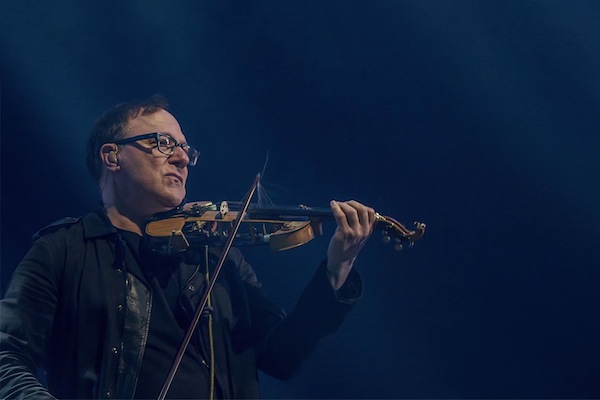
The Vancouver Symphony Orchestra (VSO) and the VSO School of Music (VSO SoM) are excited to recognize the appointment of Ben Mink, CM, as a Member of the Order of Canada. On June 29, 2022, Governor General of Canada Mary Simon announced that Ben Mink, who is a member of the board of directors for both the VSO and VSO SoM, has received the distinction “for his sustained contributions to Canadian music as a producer, multi-instrumentalist and writer.”
Mink has amassed a critically acclaimed body of work spanning decades, styles and genres as an international musical force. His influence is tangible and enduring in the widest range of musical styles and directions, and his imprint can be found in countless recordings, film scores and television programs. As a producer, songwriter, and instrumentalist, Mink has brought his signature style and approach to major musical artists and productions. He has an impressive list of recording collaborations that include k.d. lang, Rush, Daniel Lanois, Roy Orbison, Elton John, Alison Krauss, Heart, Feist, the Klezmatics, Wynona Judd, Method Man, James Hetfield (Metallica), and many more.
He has been nominated for nine Grammies, winning twice for his work with k.d. lang. The song “Constant Craving,” which he co-wrote and produced with lang, won her a Grammy for best female pop performance and has been used in several TV shows.
In 2007, he was co-nominated for his work on Feist’s Grammy-nominated “1234,” which gained global popularity in the roll out campaign for the iPod Nano. His recent collaborations with Heart were Billboard hits. Mink’s work helped set new and significant directions in Canadian popular music, and his writing and producing has been recognized with seven Juno nominations (three wins) and the SOCAN Wm. Harold Moon Award for international recognition.
To read more about Mink, including his reflections on his Jewish upbringing, visit jewishindependent.ca/ben-minks-impressive-cv.
* * *
Reesa Steele and family have the absolute pleasure to announce the upcoming marriage of Talia Magder and Weston Steele on Sunday, July 24, 2022, under the chuppah in front of family and friends in Vancouver.
Mazal tov to Nicole and Philip Magder of Montreal and Reesa Steele and David Steele of Vancouver.
Mazal tov to Talia and Weston. May this be the first of many simchas ♥
* * *
 Emmy nominee Molly Leikin is the author of Insider Secrets to Hit Songwriting in the Digital Age, published by Permuted Press, a division of Simon & Schuster, in July 2022. It is Molly’s eighth book.
Emmy nominee Molly Leikin is the author of Insider Secrets to Hit Songwriting in the Digital Age, published by Permuted Press, a division of Simon & Schuster, in July 2022. It is Molly’s eighth book.
Standing up against hatred
Pat Johnson, founder of Upstanders Canada. (photo by Paul Tillotson)
There has been a widening split between many progressive movements and the Jewish community in recent decades, according to Pat Johnson, the founder of Upstanders Canada. His Vancouver-based organization aims to encourage Canadians – especially non-Jewish Canadians – to stand against hatred of all kinds, but particularly against antisemitic words and deeds.
“You can make whatever justifications you want about what is wrong with Israel or criticize the government, but if a progressive movement finds itself at odds with 80% of Jewish people, then that is a sign that something is wrong with your worldview,” said Johnson, a member of the Jewish Independent’s editorial board.
“I have been watching as many people within the Jewish community became skeptical of the left – which their parents had built in this country. It is a betrayal.”
Long involved with progressive causes, such as gay rights, gender equality and interfaith dialogue, Johnson observed a rift forming amid the left and the Jewish community at the time of the Second Intifada that began in the Middle East in 2000.
“When Yasser Arafat turned to violence and the world, led by progressives, sided with the violence instead of demanding he return to the negotiating table, that is when the global left went off the rails,” he posited.
Johnson maintains that the North American left, with few exceptions, has let down the Jewish people. “If you do not believe in the Jewish people’s right to self-determination and that is the only people you do not support, then there is a problem in your movement.”
An ardent supporter of Israel, this was the genesis of his cognitive dissonance with the left. “I am a progressive Canadian and a fervent Zionist and there is nothing contradictory about that,” said Johnson, who is not Jewish. “What is contradictory is calling yourself a progressive and not supporting the Jewish people’s right to self-determination. I might not fit on the left any more but that is not because of me. It is because of them.”
The tipping point for Johnson happened in October 2018 on a return flight from Israel. On the airplane, he learned of the mass shooting at the Tree of Life synagogue in Pittsburgh. He realized then the need to launch Upstanders Canada.
“I thought somebody has to do something, I guess that someone could be me. We can’t pretend any more that this is not a serious problem in North America,” he said. “The Jewish community has always had to fight their battles themselves while progressives are standing up as allies to every socio-cultural group except Jews.”
An example Johnson uses to demonstrate this point is how many progressives have taken it upon themselves to disagree with the definition of antisemitism developed by the International Holocaust Remembrance Alliance. This, he asserts, they would not do with any other group. “When you treat the Jewish people differently than any other group in society – that is problematic,” he contended.
Antisemitism can be a “perfect prejudice,” he added, as Jews are deemed powerful by many, including those on the left. Thus, though most progressives may think antisemitism is not right and not view themselves as antisemitic, there is an element of “sticking it to the man and that the Jewish people will be just fine.”
“There is a theory that whatever happens to the Jewish people happened because they brought it on themselves and it is not something we say with any other group. Progressives will never say that any other victim of a hate crime brought that act upon themselves,” said Johnson.
A solution, Johnson believes, is for supporters of Israel to stop arguing with the people who will never agree with them. Instead, what should be done is to identify and mobilize the people who agree with Israel’s right to self-determination and don’t need convincing.
To Upstanders Canada, antisemitism is not a Jewish problem – it is a non-Jewish problem with serious implications for Jewish people. It is a problem created by non-Jewish people that needs to be confronted by non-Jewish people, said Johnson.
Upstanders Canada takes no position on issues that deserve to be resolved by Jewish people or the state of Israel, he said. Rather, it is based on the belief that Jewish people have a right to live safely and free from fear everywhere in the world.
The organization is currently building its database of allies. They welcome everyone, including those in the evangelical community and those communities in which antisemitism has surfaced, such as political parties on the left and trade unions.
In the past few months, Johnson’s letters have appeared in several newspapers across the country, reminding Canadians to be vigilant in the fight against bigotry and hatred.
Johnson has a long-standing connection to the Jewish community. In addition to being a regular contributor to the Independent, he has worked with numerous organizations: Hillel BC, Canadian Jewish Congress, the Vancouver Holocaust Education Centre and the Louis Brier Home and Hospital.
“I don’t have the short answer for how I wound up in the Jewish community, so I just say bashert [destiny],” Johnson said.
For more information, visit the website upstanderscanada.com.
Sam Margolis has written for the Globe and Mail, the National Post, UPI and MSNBC.
HIPPY fêtes trailblazer
Carol Slater (photo from mothersmattercentre.ca)
Carol Slater, a former vice-president of National Council of Jewish Women of Canada, was presented with the first-ever Trailblazers Award for helping bring to Canada an innovative Israeli-founded education program that empowers mothers of preschool children.
The award, presented by the Mothers Matter Centre, was part of a virtual event May 5. (See jewishindependent.ca/mothers-importance.)
Slater was one of a small group of people who brought the program Home Instruction for Parents of Preschool Youngsters (HIPPY) to Canada two decades ago. The initiative, which has taken off in countries worldwide, began out of the Britannia Community Centre and Britannia Community Secondary School, in East Vancouver. The national headquarters of the program remains in Vancouver, under the auspices of the Mothers Matter Centre. HIPPY Canada changed its name in 2017 to the Mothers Matter Centre to reflect the fact that they deliver a range of programs, although HIPPY remains the core of the organization.
Slater spoke with the Independent recently, along with Wazi Dlamini-Kapenda, a Vancouverite who was the first HIPPY director in Canada and remains head of the national program.
HIPPY was started in 1969 at the Hebrew University of Jerusalem by the late Dr. Avima Lombard.
“When the first wave of African immigrants came to Israel and spoke no Hebrew, [Lombard] realized the disconnect between the children and the parents,” Slater said. “The parents didn’t know what was expected of the children, or of the parents.”
Slater and Dlamini-Kapenda take pride in the relative simplicity of the HIPPY structure. A new program is developed when a community identifies HIPPY as a program that would be of benefit to mothers and children. The community then approaches the Mothers Matter Centre to help with starting it up. In other cases, MMC approaches the community to let them know about the program and support them in implementing it, providing seed funding to get it off the ground, said Dlamini-Kapenda. The community can start with a minimum of two to four home visitors, depending on the size of the community, then each visitor recruits 10 to 12 families. The home visitor drops in on each family every week for at least an hour during the school year, and teaches the mother the week’s activities using the HIPPY curriculum. The lessons are taught using role-play, in which the home visitor and the mother take turns being the teacher (mother) and the student (child), practising the lesson before the mother teaches the week’s lessons to their preschooler.
“The basis of this program is that all parents want the best for their children, all parents want their children to succeed and to enter school ready to learn,” said Dlamini-Kapenda. “The parents themselves can play a role in this in building capacity within the home. Instead of parents relying on sending their children to preschool, which some parents couldn’t afford, we could go into the home, which is actually important because the home is where success begins. We all know that.”
“One of the very critical things,” Slater said, “is giving the parent the confidence that she can go to [her child’s] school because what has very often happened in immigrant situations is that the mother may not speak the language very well and, if she doesn’t go to school, she doesn’t follow her child and if she doesn’t follow her child, her child can fall behind and she doesn’t know about it. One of the most important things is the empowerment of the parent to understand that she is the first teacher of her children. It’s a fantastic concept when you think of it. So simple.”
The program is offered free to mothers and all supplies are provided, although almost everything that the mother will need to do activities can be found in the home. The families targeted for the HIPPY program are those with low literacy or deemed “at risk.” Special emphasis is given to immigrant and refugee communities and Indigenous populations. HIPPY has separate streams for multicultural and Indigenous families, recognizing different approaches to learning. Home visitors will usually be recruited from within the linguistic communities they serve.
Slater’s award recognizes her work in getting HIPPY off the ground in 2001.
“Carol was very instrumental in getting the funding and knocking on doors and talking to every person in a position to be able to get us the first funding to run the first four or five years of the program here in Canada,” said Dlamini-Kapenda. “I don’t know, without Carol, how far we would have gone.”
Dr. Debbie Bell, founding director of Simon Fraser University’s community education program, was working on developing strategies to create access to education for low-literacy communities. Slater and Bell connected after Slater happened upon a brochure about the nascent program. Slater, who has lived in Israel, Vancouver and, now, Montreal, saw it as an ideal fit for National Council of Jewish Women.
Seizing the moment, Slater beat the bushes for financing. Bell was emphatic that they should not launch HIPPY without a budget for several years of programming because that would be unfair to participating families. Slater went to Ottawa and, with the help of several key figures, obtained funding from the federal health ministry to get HIPPY up and running.
She credits Dr. Hedy Fry, member of Parliament for Vancouver-Centre, as an early supporter.
“She was so excited about the program,” Slater recalled. “She met Debbie and myself and we used to meet in her office. She sat me at a desk, she gave me a list of all the cabinet ministers and their secretaries and their private phone numbers. I just sat there and I phoned.”
An assistant to Allan Rock, who was then minister of health, was equally supportive. Slater left the meeting with a commitment for $250,000, which jumpstarted HIPPY Canada.
Slater also credits late Vancouver philanthropist Jack Diamond and the Diamond Foundation for crucial support that got the program started. The Vancouver Foundation also committed to four years of funding, something they had never done before, said Dlamini-Kapenda, who was then hired as the first HIPPY coordinator in Canada.
At the awards ceremony earlier this month, Canada’s chief public health officer, Dr. Theresa Tam, and Dr. Cindy Blackstock, a Gitxsan activist for child welfare and a professor in McGill University’s School of Social Work, received the Because Mothers Matter Award for their noteworthy professional accomplishments while giving back to their community. Two HIPPY mothers with extraordinary stories, Nusrat Awan and Jessica Seegerts, were also honoured.
Jewish film fest runs in March
Niv Nissim, left, and John Benjamin Hickey co-star in Sublet, one of the Vancouver Jewish Film Festival’s many offerings this year. (photo from facebook.com/subletfilm)
The Vancouver Jewish Film Festival will take place exclusively online March 4-14. And, while you might think that COVID’s continued presence would necessitate a trimmed-down festival lineup, there are as many high-quality and diverse films being offered this year as in previous years. We give JI readers a small teaser of what’s to come, with more reviews in our next issue.
Sublet explores divides
In the film Sublet, a New York Times travel writer whose shtick is to get a feel for a city in just five days arrives in Tel Aviv. Michael (John Benjamin Hickey) has booked the apartment of film student Tomer (Niv Nissim) but, realizing the student has nowhere to go, the pair end up as temporary roommates.
The somewhat uptight middle-aged Ashkenazi American, standing out like a sore thumb in his semi-casual blazer, is contrasted with the hot-tempered, in-your-face young Sabra. The differences between the two men – and, by extension, between two generations of Jews, of gay (or, in Tomer’s case, possibly bisexual) men, of Israelis and Diaspora Jews – form the heart of the leisurely paced film. Just as Tomer ridicules Michael’s touristy ideas of Tel Aviv’s highlights, the cinematography captures the city at some of its grittiest best.
Is it a generational divide or a cultural one that has Tomer and Michael adopting wildly different sensibilities toward the tragedies of recent Jewish history and the experiences of gay men in the AIDS crisis, which Michael’s first book explored?
“It’s so depressing,” Tomer says of the AIDS pandemic. “Why does everything always have to go back to that?”
A more stark response – and one that is darkly humorous but startlingly confusing to Michael and perhaps many viewers – comes when one of Tomer’s friends is discussing fleeing Tel Aviv for a more successful artistic life in Berlin.
“It’s a bit odd that you’re moving to Germany, the place that symbolizes Jewish tragedy,” Michael observes. The Israeli pair pauses for a moment, then burst into hysterical laughter.
“Berlin’s, like, the coolest place,” Tomer assures Michael.
The theme of patrimony runs through the drama. Michael and his partner are struggling to find a surrogate for a baby they want to parent. Tomer, it turns out, is himself the product of a mother who chose the path of artificial insemination. Michael is wondering if he is getting too old to start afresh as a father. Tomer, in his clumsy way, may be struggling with the absence of his own paternal influences.
The bonds and divisions between generations, between conceptions of the past, between Israel and exile are explored but unresolved in this pleasant (if sometimes PG) film. The brief glimpse of Tomer’s hilariously awful horror film is just a bonus.
A shiva from hell

When her parents browbeat her into attending a shiva, Danielle does not expect to run into Maya. The two young women have an entwined past, so much so that other attendees can’t remember which one is which. The film Shiva Baby quickly turns into a subtly riotous adventure in the joys and drawbacks of tight-knit communities and the challenges of keeping secrets in a yenta-intensive environment.
Though their shared history is a source of immense awkwardness and brilliantly snarky sparring, for Danielle (Rachel Sennott), this shiva is a house of horrors. Having told so many lies to cover her failure to launch successfully into adulthood, every turn, every new face at the shiva, is an opportunity for sequential interrogations and fresh humiliation. It becomes an unintentional parlour game to piece together the variety of stories Danielle has told of changing majors, areas of specialization and plans for the future. Family, friends and acquaintances compare conflicting tales Danielle has woven over the years, creating an elaborate narrative of mostly imagined endeavours.
Her parents Debbie (Polly Draper) and Joel (Fred Melamed) seem both oblivious dupes and co-conspirators in Danielle’s web of deceptions. The loving but exasperatingly overbearing parents add to their daughter’s discomfort time and again, leading to an understated climax that literally shoves Danielle’s bad choices in her own face.
This “comedy of discomfort” is a masterpiece of interfering adults and world-weary youth. The unifying bond between generations is a shared art for the backhanded compliment and straight-up insults. After Danielle spills coffee all over herself and a friend’s baby, her mother offers solace: “Well, thank God Sheila’s coffee is always lukewarm.”
Shiva Baby, a Canadian-American co-production, features a musical score that amusingly invokes the horror genre to emphasize the nightmare scenario in which Danielle finds herself, almost exclusively of her own design. Any awkwardness on the part of the viewer is alleviated by schadenfreude that whatever she has coming is probably well overdue.
For tickets to the festival, visit vjff.org.
Publisher’s welcome
Cynthia Ramsay (in 2017). (photo by Lianne Cohen)
When we decided to have a celebration marking 18 years since the beginning of the latest chapter of the Jewish Independent’s nearly-nine-decade history, it made perfect sense to focus on the future as much as the past.
The centrepoint of the JI Chai Celebration is the JI’s 18 Under 36 Awards. The day’s headlines might be cause for dejection, but anyone who works with, or spends any time with, members of this community’s younger generations knows that the future is bright.
This truly is reason to celebrate.
I am amazed to think I’ve owned the newspaper for longer than some of our awardees have been alive. I don’t feel that old. On the other hand, it does seem like another lifetime when Kyle Berger, Pat Johnson and I bought the Independent’s predecessor, the Jewish Western Bulletin, from publishers Sam and Mona Kaplan. Kyle was 24, Pat was 34 and I was 29 – we all would have qualified for the JI’s 18 Under 36 Awards, and I’d like to think we might have offered some tough competition.
I would say to younger audiences, as both a promise and a warning: beware of how way leads on to way. Sometimes wonderful things happen and the mission of your life presents itself without you even realizing what’s happening.
My roots are not here. My immediate family has lived in Ontario for a long time now. And, when I came here about 25 years ago from Ottawa, I intended to spend a year in British Columbia, get my master’s in economics at Simon Fraser University, then return east and do a PhD in economics at University of Toronto.
But, I got a job in Vancouver as I was finishing my MA, and worked as an economist until, one day, I took a phone call from the then-publisher of the Jewish Western Bulletin. I’d never heard of him … or it. My involvement with the Vancouver Jewish community was through music – with the Vancouver Jewish Folk Choir, with whom I still sing today, and Beth Israel Choir. The paper was looking for someone to fill in writing editorials and I was looking for a change, so I agreed to take the job – for the summer.
As I mentioned, one thing leads to another, and the Kaplans, who had published and edited the JWB since 1960, wanted to retire. Pat and Kyle, my then-newfound friends and colleagues, suggested we put in a bid to buy the paper. I didn’t think the Kaplans would sell it to such a green team, as there were some other serious bidders with far more experience in business.
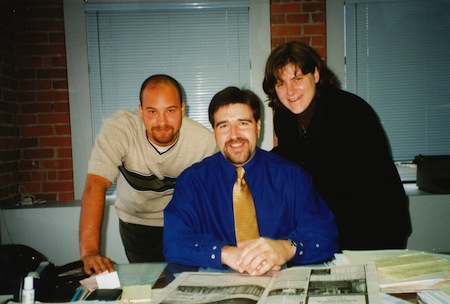
But the Kaplans saw something in the three of us that I certainly did not. They were Orthodox Jews, Zionists who brokered no criticism of Israel, and believed in advocacy journalism. We were secular, Zionists of a rather more open-minded variety, firm advocates of free speech and believed that journalism should be as objective as possible. Despite our obvious differences, I think the Kaplans recognized in us something of the inevitable future.
While Kyle and Pat have moved on to other endeavours, they thankfully remain involved in the paper and are there to help and offer advice, with Pat still doing much writing, as well as serving on the editorial board.
Looking back at the past 18 years, I can say that, while we’ve had challenges, we’ve overcome them and we’ve had many more successes. And this is one of the major reasons for the JI Chai Celebration. We want to celebrate the fact that, with the community’s help and the hard work and dedication of so many over the decades, the Jewish Independent, this community’s newspaper, is a vibrant and evolving enterprise.
Still … it is no secret that the newspaper industry is a tough one these days, to put it mildly. We must find a way to keep the Independent a sustainable and quality publication – not just for the coming months, but for the coming generations. The funds raised through the JI Chai Celebration will go, in part, toward a study of North American Jewish community newspapers and other examples of community journalism, which might direct us to best practices and models for the future of the JI.
The incredibly generous financial support of Joseph and Rosalie Segal and family, and the support of Mary-Louise Albert of the Rothstein Theatre and Chutzpah! Festival, laid the foundation for this celebration. The contributions of Gary Averbach, Shirley Barnett, David Bogoch, LKP Holdings (Tzipi Mann and family), JB Newall Memorials, Olive+Wild, Red Truck Beer, Vancouver Learning Centre, Web exPress, Yosef Wosk and so many others made it all possible. Led by talented event manager Bonnie Nish, all of this came together in three months.
Everyone performing here today is donating their time, as is the bartender and the volunteers you’ve seen on tickets, at the auction tables, ushering, all about. And about that auction table – thank you so much to all the donors to the auction and those who contributed the prizes for tonight, including the gift packages for the 18 awardees.
In addition to funding a study that can set the course of the paper’s future, revenue from this event will help stabilize the Independent and let us continue the important role we play as a mirror to and a voice of this community.
To ensure that independent Jewish journalism survives and thrives in this city and province, though, it ultimately depends on you. I ask you to support this newspaper by reading, sharing, subscribing, advertising or donating.
If you still wonder why and for whom we need to continue building this community and strengthening the media that shares its stories, look only to the 18 individuals being honoured tonight and to the future that they represent.
The JI wins two Rockowers
Earlier this month, the American Jewish Press Association announced the winners of this year’s Simon Rockower Awards for Excellence in Jewish Journalism, which honor achievements in Jewish media published in 2014. In its division (newspapers with 14,999 circulation and under), the Jewish Independent garnered two first places.
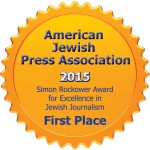 Publisher and editor Cynthia Ramsay won the first place award for excellence in writing about Jewish heritage and Jewish peoplehood in Europe for her article “World Musician at Rothstein” (Nov. 21, 2014), about the work of Lenka Lichtenberg. The group Art Without Borders was bringing Lichtenberg to Vancouver from her home base of Toronto for a solo performance at the Norman and Annette Rothstein Theatre. The article includes reviews of Lichtenberg’s three most recent CDs and how, in all of her music, “the memory and traditions of those who have lived before can be heard – they are celebrated, and merge with the memories, traditions and passions of Lichtenberg and the artists with whom she collaborates.”
Publisher and editor Cynthia Ramsay won the first place award for excellence in writing about Jewish heritage and Jewish peoplehood in Europe for her article “World Musician at Rothstein” (Nov. 21, 2014), about the work of Lenka Lichtenberg. The group Art Without Borders was bringing Lichtenberg to Vancouver from her home base of Toronto for a solo performance at the Norman and Annette Rothstein Theatre. The article includes reviews of Lichtenberg’s three most recent CDs and how, in all of her music, “the memory and traditions of those who have lived before can be heard – they are celebrated, and merge with the memories, traditions and passions of Lichtenberg and the artists with whom she collaborates.”
The JI editorial board – Pat Johnson, Basya Laye and Ramsay – won the paper’s other award: first place for excellence in editorial writing. The three editorials that comprised the winning entry were “The message is universal” (March 7, 2014), about plans for the Canadian National Holocaust Monument to be constructed in Ottawa; “The spirit of Limmud” (Feb. 14, 2014), about how the vision and passion of one woman, Ruth Hess-Dolgin z”l, significantly enriched our community by initiating the movement to bring Limmud here; and “Uniquely set apart for exclusion” (May 9, 2014), about the Conference of Presidents of Major American Jewish Organizations decision to exclude J Street from the group.
The Rockower awards will be presented at AJPA’s annual conference, which, for the second year in a row, is scheduled around the Jewish Federation General Assembly being held in Washington D.C. Nov. 8-10. AJPA sessions will be held Nov. 9-11. The entire list of Rockower winners can be found at ajpa.org/?page=2015Rockower.

